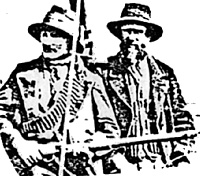
The most recent MWAN (#48) includes a letter from Calum Delaney of the RSA. Part of the letter spelled out a real neat idea. It had to do with the deference between descriptive rules vs prescriptive rules. This article will represent Calum's idea and apply it a little.
The idea runs thus ... Rules for games can be broken down for study into two groups. The first group of games are those with set rules that TELL the player EXACTLY what to do. They prescribe actions. Most games fall into this category. The second group of rules are those tell HOW something is done with the expectation that things could be done differently if the parts are put together differently. They describe what is happening without imposing on the player what has to happen next.
Calum pointed out In his letter that the idea of prescriptive vs descriptive rules comes out of linguistics. This makes sense since linguistics is the study of the "rules" of language. I don't know how heavy Calum is in to linguistics but if one doesn't mind getting headachs this branch of philosophy is full of useful ideas about causality and other ideas.
So why is it that nearly all the rules that are used in wargames are prescriptive? Calum clearly observes that "The rules we use in our games, from the sublime (WD "one brain cell") to the ridiculous (WRG/Newbury - no one can be that serious) are all very prescriptive." Calum seems to think that this is due to our having too little basic research, and too many games that are based on other games. In other words by distilling distilled water all we get is water with a nastier taste. He may be right, but I think there might be another answer as well.
I am struck by how many games seem to have "grown" out of other games. Look at how many games Use "combat, factors" - or "combat tables." Clearly these are games that idea-wise are chained to "Tactics II." If this is the case then it does not matter how much research the game maker does since it will all be fitted (square peg into round hole) into the preexisting paradigm. The game works, but is it really any different than its grand daddy?
The problem may be that we are encouraged to think in "Prescibed" ways. Education teaches rote thinking. Work is quite often repetitive, so why not our recreation as well. One thing is obvious, none prescribed thought is NOT easy. It forces a person to be creative. I for one do not always like to do this on a Sunday afternoon.
Prescriptive games seem to grow out of a move and shoot frame of mind. Chess is probably the real grand daddy rather than Tactics II. Unfortunately there is only so much communication that can happen here. Looking at morale might expand the communication some but If the move/shoot mentality Is still the overall world view of the game then the game will probably not be very new.
Calum mentions how first hand accounts of battles, and the classics (the books of Featherstone, and Grant) are descriptive. I Imagine that good history books are in this category as well. Perhaps live role playing would fit as well, if the players had very good post game debriefings. All In all though there is a dearth of types of games that are descriptive.
Matrix games may at times be descriptive, since they are built on the idea of arguments rather than movement. Yet there are problems here too. An MG does not TELL the player what to do. The rules are only procedures to resolve arguments. But what if the matrix suggests that infantry squares always beat cavalry? Players may be led by this Into not questioning that this Is the only possible outcome.
MGs grow out of a different world view than move/shoot games. The conflict is more on a level of argument and changing ideas (in fact some of the ideas came from linguistics). The big problem I see with MGs is how it looks like the players are just "making up" what they want to happen. The prescriptive side of me says that that ain't right. The nagging question "Is this really how battles work? Or am I just fooling myself?" comes to mind.
What "descriptive rules" would look like is another tricky problem in this idea. I tackled this one when I first started working on MGs. The word, rules, implies some kind of orderly, repeatable process. The problem with description is that it is hard to repeat (after all two story tellers never tell the same story in exactly the same way). MGs are my answer to what I started of calling "verbal analysis" games, but I'm certain there are more ways to be descriptive than just one.
Calum's idea has stirred up a lot of thoughts in my head about what I am doing. maybe that is what description is all about. Asking the questions, rather than being given the answers. If this idea tweaked your imagination write and let me know what you come up with. Half baked ideas on this topic are to be encouraged.
Back to Experimental Games Group # 10 Table of Contents
Back to Experimental Games Group List of Issues
Back to MagWeb Master Magazine List
© Copyright 1990 by Chris Engle
This article appears in MagWeb (Magazine Web) on the Internet World Wide Web. Other military history articles and gaming articles are available at http://www.magweb.com